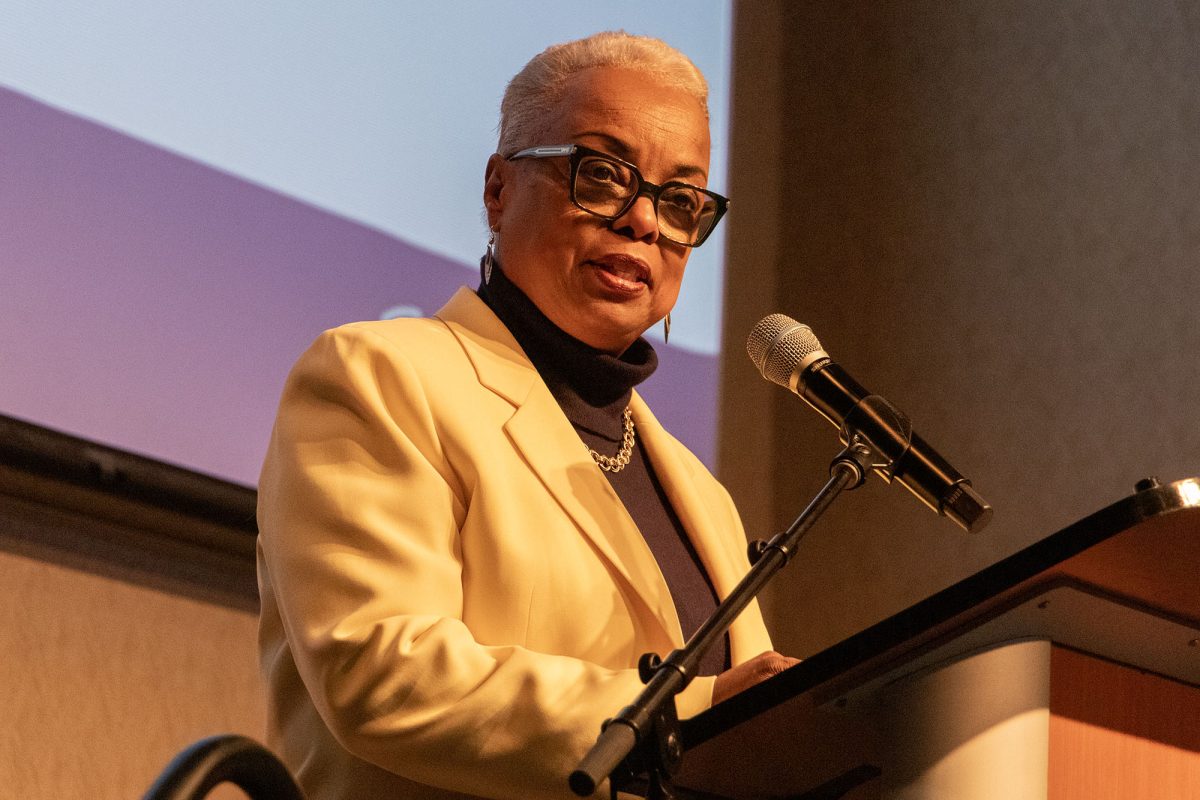Ithaca College administrators shared updates about their efforts to close the college’s budget deficit — guided by the administrative analysis study conducted with the Huron Consulting Group — at the State of the College meeting Feb. 11 in Emerson Suites.
Addressing the deficit
The college has carried a budget deficit for three fiscal years. After enrollment did not increase in Fall 2024 as projected, the Board of Trustees charged President La Jerne Cornish with delivering a plan to balance the budget by fiscal year 2028. The college started the administrative analysis study with Huron in October 2024.
Cornish reiterated her statement from the October State of the College meeting — “the college cannot cut its way to success” — and said college administrators are working to identify areas to adapt, grow and invest in the community in addition to aligning revenues and expenses.
Tim Downs, chief financial officer and vice president of the Division of Finance and Administration, said administrators hope the Huron study will help improve efficiency and make the college more nimble so it can better adapt to changing industry conditions and avoid returning to a budget deficit within a few years.
Downs said Huron has conducted six quantitative analyses to identify potential actions to balance the budget. According to Downs’ presentation, three of the quantitative analyses used external metrics — or data from outside of the college. Huron compared the college’s performance with benchmarks from peer institutions and the industry as a whole. Huron also identified several industry trends to guide the college’s strategic priorities.
Huron also used internal metrics — or data about the college — to conduct the other three quantitative analyses. Huron conducted a longitudinal analysis to understand historical trends in enrollment, staffing and expenditures and their correlation. Huron also executed an internal comparative analysis to benchmark within specific areas of the college and across the college as a whole. Finally, Huron analyzed key performance indicators to determine which goals the college is meeting and where the college should change its approach.
Downs said Huron also engaged in qualitative analyses by holding discussions with the vice presidents of the college.
“Data alone is not enough,” Downs said. “It’s been the talks and the conversations with the vice presidents. It’s understanding what our campus is, what our product is, and really building that understanding so it can go in lockstep with the data that we’re looking at.”
Melanie Stein, provost and senior vice president for academic affairs, explained that Huron has identified more than 60 actions the college can consider to reduce the budget deficit. Stein said many of the actions center around stabilizing and increasing enrollment; expanding existing and adding new revenue streams; restructuring across the divisions of the college; and investing in staff and faculty compensation.
“As we all know, we must reckon with faculty and staff compensation,” Stein said. “That’s not a cost cutting measure … but it’s critically important, because the faculty and staff are our best resource, and it’s the faculty and staff that are going to help move this institution into the future.”
Stein also noted that the college is working with Hanover Research to identify new academic offerings that the college can develop in the coming years.
Stein said administrators are now vetting each of Huron’s proposed actions and determining which actions to incorporate into a budgetary roadmap for FY 2026-28. Cornish said she will present the roadmap to the Board of Trustees’ finance and investment committee in April and will present it to the full board in May if the committee approves.
Stein said she understood audience members were likely wondering when they would learn about any changes to their area.
“When we get to that point — and I have to note we are not there right now — if your area is directly affected by some part of this plan, you are going to find out from your area’s leadership,” Stein said. “We are going to work with the vice presidents and the leadership underneath them to filter things down.”
During the question and answer portion of the event, Peter Johanns, associate professor in the Department of Media Arts, Sciences, and Studies, noted that one of the presentation slides said there was an opportunity for “policy and benefit changes” and asked if administrators planned to decrease benefits.
Cornish said administrators were still vetting options and did not have that level of detail yet.
“Let me be clear, there’s nothing that’s not on the table,” Cornish said. “From every level of this institution, from the top to the bottom, we must align our expenses with our revenue and beyond for the future of the institution.”
National events
Cornish said it is unclear how executive orders, particularly those related to research grant funding and diversity, equity, inclusion and belonging, could impact the college. Cornish said the college remains committed to equity, inclusion and belonging on campus.
“Much is uncertain, including what proposed changes to the Department of Education might mean for Ithaca College and other institutions like us,” Cornish said. “We are monitoring these developments and we are working with departments and employees who may be impacted.”
Junior August Culhane asked if the college has plans or policies to protect transgender and gender nonconforming students from potential federal actions targeting those groups.
Cornish said New York state law and college policy both prohibit discrimination on the basis of protected characteristics like gender identity and expression.
“While I cannot say what can happen in the rest of the world, I can say that you are welcome here, that you are safe here and that we will continue to make sure that all of our community feels like they belong, because you do,” Cornish said.
Ruth Barber, assistant professor in the Department of Theatre Production and Management, asked how much the college relies on federal funding.
Downs said the college receives about $40 million each semester in Title IV funding. Downs clarified via email that the college receives about $44 million per academic year in Title IV funding.
Marc Israel, associate vice president for Business and Finance, said via email that federal research grants are generally reimbursement based. As of the end of the 2024 calendar year, the college had a total residual balance of $1.6 million available for drawdown, or reimbursement, from the federal government.
Downs said administrators are monitoring executive orders and congressional actions that could impact the college’s funding or students’ ability to pay for college.
“We also want to be very careful not to be too reactionary,” Downs said. “We are heavily dependent on federal aid, so we want to be very cautious about any changes.”
Closing
Cornish said campus community members can email [email protected] with questions and suggestions to reduce the deficit or increase revenue. Downs will share more information about the college’s finances during the Dollars and Sense meeting at 8:30 a.m. Feb. 27 in the Klingenstein Lounge.
“We have difficult decisions to make,” Cornish said. “We are approaching this work with passion, with compassion and with commitment. Every decision we make will be based on what we believe is best for this institution.”
Editor’s Note: The Ithacan followed up after the presentation to ask for more specific data about the research grants and funding that the college receives from the federal government. This article has been updated accordingly.















